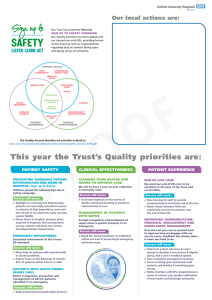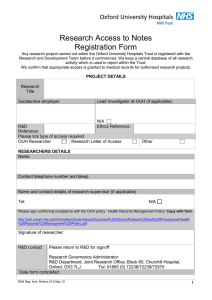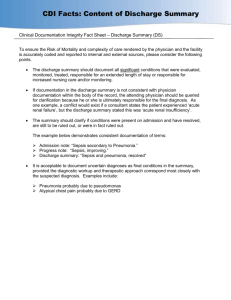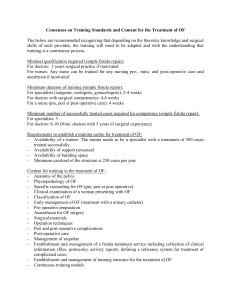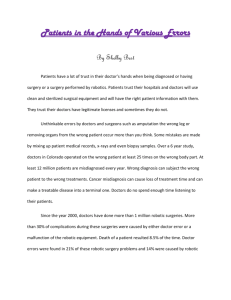Document 11644689
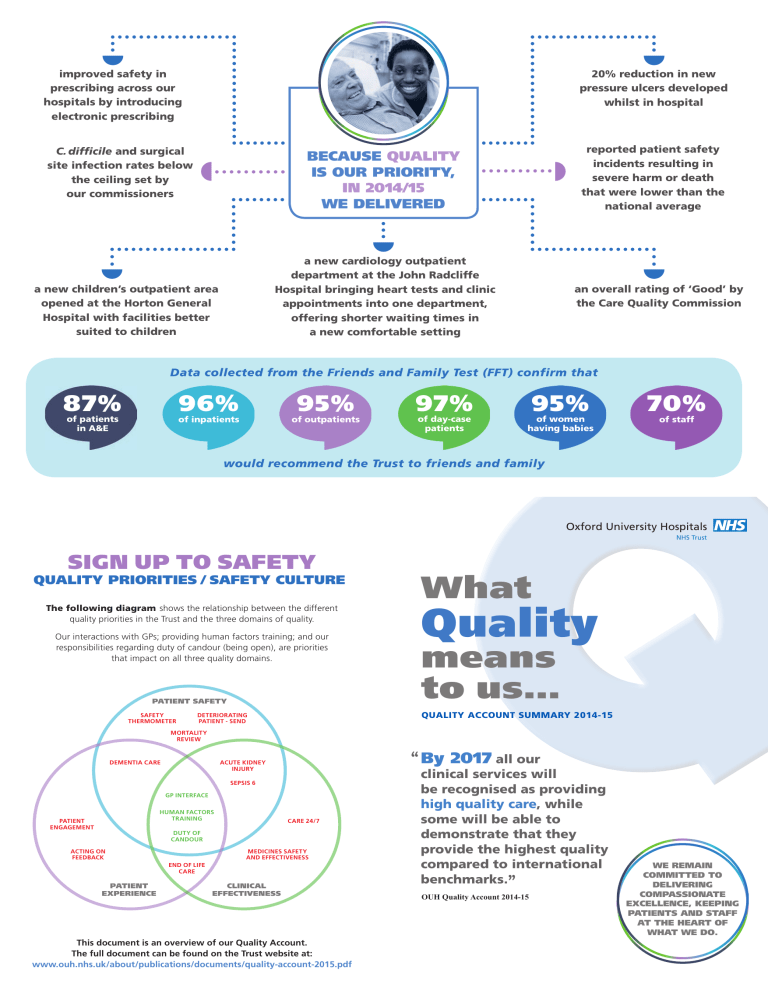
improved safety in prescribing across our hospitals by introducing electronic prescribing
C. difficile and surgical site infection rates below the ceiling set by our commissioners
BECAUSE QUALITY
IS OUR PRIORITY,
IN 2014/15
WE DELIVERED
20% reduction in new pressure ulcers developed whilst in hospital reported patient safety incidents resulting in severe harm or death that were lower than the national average a new children’s outpatient area opened at the Horton General
Hospital with facilities better suited to children
87% of patients in A&E a new cardiology outpatient department at the John Radcliffe
Hospital bringing heart tests and clinic appointments into one department, offering shorter waiting times in a new comfortable setting an overall rating of ‘Good’ by the Care Quality Commission
Data collected from the Friends and Family Test (FFT) confirm that
96% of inpatients
95% of outpatients
97% of day-case patients
95% of women having babies
would recommend the Trust to friends and family
70% of staff
SIGN UP TO SAFETY
QUALITY PRIORITIES / SAFETY CULTURE
The following diagram shows the relationship between the different quality priorities in the Trust and the three domains of quality.
Our interactions with GPs; providing human factors training; and our responsibilities regarding duty of candour (being open), are priorities that impact on all three quality domains.
PATIENT SAFETY
SAFETY
THERMOMETER
DETERIORATING
PATIENT - SEND
MORTALITY
REVIEW
PATIENT
ENGAGEMENT
ACTING ON
FEEDBACK
DEMENTIA CARE
GP INTERFACE
HUMAN FACTORS
TRAINING
DUTY OF
CANDOUR
ACUTE KIDNEY
INJURY
SEPSIS 6
CARE 24/7
MEDICINES SAFETY
AND EFFECTIVENESS
END OF LIFE
CARE
PATIENT
EXPERIENCE
CLINICAL
EFFECTIVENESS
This document is an overview of our Quality Account.
The full document can be found on the Trust website at: www.ouh.nhs.uk/about/publications/documents/quality-account-2015.pdf
Oxford University Hospitals
NHS Trust
What
Quality means to us…
QUALITY ACCOUNT SUMMARY 2014-15
“
By 2017
all our clinical services will be recognised as providing high quality care , while some will be able to demonstrate that they provide the highest quality compared to international benchmarks.
”
OUH Quality Account 2014-15
WE REMAIN
COMMITTED TO
DELIVERING
COMPASSIONATE
EXCELLENCE, KEEPING
PATIENTS AND STAFF
AT THE HEART OF
WHAT WE DO.
These were our Quality Priorities for 2014/15
PATIENT SAFETY CLINICAL EFFECTIVENESS PATIENT EXPERIENCE
CARE 24/7
Safe, effective and high quality care on all four sites ‘24/7’ – twenty four hours a day, seven days a week.
What we did
Reorganised the ‘Out of Hours’ team – nurses and clinical support workers took on extra skills allowing junior doctors to spend more time with sicker patients.
Improved communication process between day and night teams relating to concerns about sicker patients.
What this means
This is a national project and forms part of our plans to make our hospitals even safer and efficient during evenings and weekends. Helping the Out of Hours team prioritise its workload means sicker patients are seen quicker.
DIABETES AND PNEUMONIA
Lots of our patients have diabetes, whilst many with pneumonia are looked after on general rather than specialist respiratory wards. We examined our care at risk summits and made plans to improve our services.
What we did
Increased diabetic specialists (doctors,
nurses, podiatrists) so more diabetic patients
and those with diabetic foot disease are
seen faster. Increased staff training.
Patients with suspected pneumonia are now seen by a senior doctor within
30 minutes.
What this means
The nurses and doctors have had extra
training and help from the specialist team.
The respiratory team can give advice and visit patients on wards with severe respiratory conditions to help improve their breathing and posture.
MEDICAL DOCTORS CARING FOR
PATIENTS IN SURGICAL AREAS
When medical doctors help look after patients with complex health problems in surgical areas they often get better faster.
What we did
Maintained a five-day service on the Surgical
Emergency Unit. We hope to expand this to other services 2015/16.
DISCHARGE FROM HOSPITAL
Our goal was to simplify and standardise the process of discharge so as to improve the experience of patients.
What we did
Ran a winter campaign on how to keep well
over the winter.
Produced new joint policies with other organisations to improve the discharge process.
Made major improvements to turnaround
and pick up times by Arriva transport service.
OUTPATIENT SERVICES
We wanted to improve the experience of our outpatient department (OPD).
What we did
Made more clinic slots available in OPD so it
is easier for patients to book appointments.
Ran customer care training for clinic managers.
PSYCHOLOGICAL MEDICINE SERVICE
Our goal was to set up a team of psychologists and psychiatrists to support patients with prior psychological problems when they have a physical illness.
What we did
Expanded the team. Patients urgently referred have access to a psychiatrist within four hours, and routine referrals within one working day.
And it doesn’t stop there – this year our priorities are:
PATIENT SAFETY CLINICAL EFFECTIVENESS PATIENT EXPERIENCE
PREVENTING AVOIDABLE PATIENT
DETERIORATION AND HARM IN
HOSPITAL: Sign up to Safety
OUH has joined the national Sign Up to
Safety campaign.
Success will mean:
Spotlight on seriously ill & deteriorating patients via twice daily consultant reviews in intensive & high dependency areas and the roll out of our electronic early warning system (SEND).
Fewer harms in hospital: pressure ulcers acquired in hospitals, falls causing harm, urinary catheter infections and venous thromboembolism (blood clots).
EMERGENCY DEPARTMENT
Sustained achievement of the 4 hour
ED standard.
Success will mean:
More help for patients with mental health or alcohol problems.
Intense focus on the discharge of transfer
95% of patients within 4 hours in A&E.
PATIENTS WITH ACUTE KIDNEY
INJURY (AKI)
Better recognition, prevention and management of AKI for patients admitted in an emergency.
Success will mean:
Kidney blood tests checked within 24 hours.
LEARNING FROM DEATHS AND
HARMS TO IMPROVE CARE
We aim to have a year on year reduction in mortality rates.
Success will mean:
Increased emphasis on the review of deaths and shared learning to maximise improvements in care.
MANAGEMENT OF PATIENTS
WITH SEPSIS
Prompt recognition and treatment of sepsis when a patient presents in an emergency.
Success will mean:
Rapid life-saving treatment: IV antibiotics
within one hour of presenting to emergency admission areas.
END OF LIFE CARE
We want our end of life care to be excellent in all areas of the Trust and on all shifts.
Success will mean:
New training for staff to provide
compassionate & consistent end of life care.
Better liaison between OUH and community services for patients near the end of their life.
IMPROVING COMMUNICATION,
FEEDBACK, ENGAGEMENT AND
COMPLAINTS MANAGEMENT
Over the last year we’ve worked hard to improve how we engage with our service users. Feedback has shown there is more we need to do.
Success will mean:
Help from patient advocacy & carers groups to develop a new privacy & dignity policy, and a carer’s feedback system.
New complaints management training.
Focus on being open and honest with patients and families if something goes wrong.
Better interface with GPs: hospital doctors easier to contact, plus quicker notification of test results and discharge summaries.
